"In the race to patent the obvious, we've forgotten the purpose of innovation: to move forward, not to stand still and point fingers."

The Grand Comedy of Human Innovation
In the grand comedy of human innovation, few plotlines are as absurd as the saga of intellectual property. What began as a noble quest to protect inventors and foster creativity has morphed into a labyrinthine farce where ideas are currency, lawyers are kingmakers, and that doodle you scribbled on a napkin might just be your ticket to early retirement—or financial ruin.
The Tech Titans' Rectangular Rumble
In 2014, Amazon patented the revolutionary concept of... photographing objects against a white background. Crazy, yes. and also the groundbreaking technique used by every Instagram influencer and their cat suddenly became the intellectual property of the e-commerce giant. It's as if Ansel Adams rose from the grave, pointed at a smartphone, and screamed, "I called dibs on backgrounds!"
Here’s a quick snapshot of the modern tech landscape: Thunderdome of intellectual property where Silicon Valley's finest engage in gladiatorial combat over the most mundane of design elements. In this colosseum of capitalism, Apple and Samsung once locked horns in a $399 million death match over the cutting-edge concept of... rounded rectangles. Yes, the shape that revolutionized such groundbreaking inventions as "the wheel" and "not poking your eye out" became the hill upon which tech titans chose to die.
Can you even imagine what that board meeting was like? "Gentlemen, our competitors have discovered the secret of smooth edges. Deploy the lawyers!" It's as if Pythagoras himself rose from the grave, pointed at a smartphone, and screamed, "I called dibs on shapes!"
This rectangular rumble makes one wonder: if these tech titans had been around in prehistoric times, would we still be living in circular caves, terrified of infringing on the "square shelter" patent?
This rectangular rumble cost a cool $99.75 million per corner – enough to fund a small nation's R&D budget or, more practically, to develop a phone that transforms into a hoverboard (patent pending). As this geometrical grudge match raged on, one could almost hear the ghost of Steve Jobs whisper, "I said 'think different,' not 'think slightly rounded.'"
Welcome to Litigation Valley
Welcome to Litigation Valley, where common sense goes to die and where, ironically, cutting-edge innovation has all the sharp edges of a marshmallow. Instead of tumbling down a lawsuit-shaped rabbit hole, we've catapulted ourselves into a litigious funhouse where mirrors distort common sense into million-dollar settlements. Here, patent trolls lurk under every bridge of innovation, demanding exorbitant tolls for passage, while tech giants engage in elaborate games of "Simon Says" with the legal system. "Simon says round your corners. Simon says add a notch. Simon says pay $399 million." In this carnival of intellectual absurdity, the rollercoaster of progress screeches to a halt every time someone claims to have patented the concept of 'going fast while screaming.'
As if the rectangular rumble wasn't absurd enough, the tech titans decided to up the ante. Enter Oracle and Google, two behemoths who apparently looked at the smartphone squabble and thought, "Hold my beer." These Silicon Valley juggernauts locked horns in a $9 billion legal tango over Java APIs - essentially fighting over who owns the right to organize digital sock drawers. In this digital age, we've somehow managed to turn the information superhighway into a toll road, where every exit is a potential lawsuit and the GPS keeps rerouting to the nearest courthouse.
It's as if someone tried to patent the concept of alphabetical order and then sued libraries for "unauthorized use of the letter A." In this bizarro world, the Dewey Decimal System isn't just a way to catalog books - it's a potential goldmine of litigation. It's as if the library catalog system suddenly became the most valuable real estate in town. Welcome to an alternate reality where 'disruptive book-sorting algorithms' is a hot pitch for venture capitalists, and shushing skills are more valuable than coding chops.
In the great smartphone skirmish, the number of patents filed could fill more memory than the devices themselves, proving that sometimes the legal battles are more intricate than the circuitry they're fighting over.
And then there's the meme economy, a digital frontier where absurdity and legality collide in a spectacular explosion of LOLcats and lawsuits. In this pixelated Wild West, even the silliest of internet creations can suddenly find themselves in a high-noon showdown at the OK Corral of copyright law. It's a place where keyboard warriors become accidental outlaws, and the next viral sensation might just come with a side of cease and desist. Take Pepe the Frog, for instance. This once-chill cartoon character went from "feels good man" to "feels litigious, man" faster than you can say "copyright infringement." Its creator successfully sued InfoWars for $15,000, proving that in the age of the internet, even frogs have lawyers.
But why stop at digital frogs when you can download a car? The 3D printing revolution has turned the old anti-piracy PSA on its head. "You wouldn't download a car," they said. "Watch me," replied the internet, gleefully torrenting Lamborghinis and leaving manufacturers scratching their heads.
It's not far-fetched to envision a future where even our homes and cars are products of decentralized networks, with every blueprint and design file tied up in licensing agreements or intellectual property disputes. A 3D-printed cottage or custom-built electric vehicle could become less a marvel of accessibility and innovation, and more an emblem of a system in which proprietary claims mediate every aspect of creation. Even something as simple as your morning coffee might be entangled in a web of patents—whether it's the brewing method, the genetic makeup of the beans, or even the data collected by your "smart mug."
What was once the promise of democratized creativity and production could instead become a minefield of legal restrictions, stifling the very progress it set out to encourage.
Speaking of downloads, let’s address the microchipped elephant in the room—or rather, the robot in the courtroom. In a plot twist straight out of a Philip K. Dick novel, we now have AI vying to patent its own inventions. Picture the absurdity: an AI-generated chatbot stepping up to the stand, glitching slightly as it insists, "Your Honor, I may be synthetic, but my brilliance is genuine... I think.”
Meanwhile, actual human inventors are left wondering if they should start appending "Created by a meat-based intelligence" to their patent applications. It's like the setup for a joke: an AI walks into a patent office, except the punchline is our entire legal system struggling to define what it means to be an inventor. South Africa gave it the green light, the rest of the world hit pause to reboot their neurons, and philosophers everywhere updated their mantra from 'I think, therefore I am' to 'It thinks, therefore we're toast.'
As we tiptoe through the minefield of intellectual property, it's hard not to wonder: have we engineered a system so convoluted it now borders on self-parody? In our zeal to safeguard innovation, we've constructed a labyrinth so complex that even Theseus would need a GPS, a dozen paralegals, and a filing cabinet full of NDAs to make it out alive. Maybe it's time to ask the uncomfortable question: are we nurturing creativity, or just perfecting the art of yelling, "Dibs!" in increasingly expensive ways?
And then we have the pharmaceutical industry, where the noble tenets of the Hippocratic oath are warped into something more akin to a corporate chessboard, with lifesaving cures as pawns and profitability as the king. Big Pharma’s credo appears to be, “Innovation comes at a price—and so does survival.” Their alchemical genius lies in transmuting microscopic compounds into multi-billion-dollar monopolies, transforming the fundamentals of human health into commodities as traded and hoarded as any precious metal. Meanwhile, as the perfume of profit wafts through boardrooms, the Global South lingers in the shadows, clutching empty prescription bottles and wondering if vaccines come with a “Buy One, Get One Free” coupon.
Picture it: a high-stakes game of Monopoly played atop hospital beds, the "Community Chest" curiously devoid of charity, and "Free Parking" replaced with "Inaccessible Medicine"—a rare square that most won't land on because they can’t afford the dice roll. The game's true masters are pharmaceutical giants who know how to deftly sidestep ethical dilemmas by claiming patents not just for the miracle molecule itself but for every conceivable iteration, application, and derivative, locking up entire branches of medical innovation in their gilded vaults. Whether the patient is cured or merely strung along on expensive maintenance treatments seems almost incidental, as long as shareholders get their dividends.
While the innovation engine sputters under the weight of corporate collusion, the unspoken question looms larger by the day: Have we crowned profiteering as the gatekeeper of human survival? In this macabre dance between commerce and compassion—the bottom line and the life line—one can't help but wonder: what happens when the pursuit of patents begins to siphon the lifeblood from patients themselves?
In this brave new world of intellectual property, we’re left grappling with the philosophical quandary: 'If everything is extraordinary, does anything remain exceptional?' We've birthed a system so labyrinthine, it makes the tax code look like a children's book and Kafka's nightmares seem like light beach reading. It's as if we've entered the Intellectual Property Twilight Zone, where patents are filed for the revolutionary act of putting one foot in front of the other (aka walking), and trademarks are granted for thinking about thinking. At this rate, it's only a matter of time before someone tries to patent the act of patenting itself, creating an infinite loop of legal absurdity that could very well tear the fabric of the universe. Or at least keep lawyers employed until the heat death of the cosmos. Trademarks are granted for colors. And somewhere, a lawyer is probably trying to copyright the concept of irony itself.
As we teeter on the edge of the metaverse—that digital promised land where Mark Zuckerberg's avatar reigns supreme—we're not just peering into the future; we're falling face-first into a rabbit hole of intellectual property absurdity. Imagine a world where your virtual beachfront property comes with an NFT deed and a lawsuit from Poseidon for copyright infringement on the concept of waves. Picture digital art galleries where the paintings watch you back, calculating royalties for every millisecond your eyeballs linger on a pixel.
But why stop there? In this brave new world, your very thoughts could be up for grabs. Picture a dystopian nursery where newborns emerge from the womb already wrapped in copyright notices, their first cries auto-tuned and monetized. Imagine a future where daydreams come with pop-up ads and your subconscious is sponsored by corporations. "This moment of déjà vu is brought to you by Meta—where even your past lives are part of our intellectual property portfolio."
In this IP-obsessed utopia (or dystopia, depending on your lawyer's hourly rate), will we finally achieve the ultimate goal of capitalism: the commodification of human consciousness itself? Or will we simply drown in a sea of cease-and-desist letters, our creativity suffocated by the very laws meant to protect it?
One thing's for certain: in this brave new world, even irony won't be free. So buckle up, future dwellers. The ride into tomorrow is patented, the seatbelts are trademarked, and the emergency exits are strictly proprietary. Welcome to the future—where even your nightmares come with terms and conditions.
The Irony of Innovation
In the grand irony of it all, the very system we crafted to nurture innovation now threatens to strangle it in its cradle. We've woven a web so intricate, so bewildering, that even the mythical Daedalus would look upon our legal labyrinth and mutter, "Nope, I'm out."
But don't despair, intrepid inventors and daydreamers. In this cosmic farce of intellectual property, we're not just the audience—we're the unwitting stars of the show. Our ideas, our creativity, our very thoughts are all potential plotlines in this never-ending legal dramedy.
So the next time inspiration strikes, remember: you're not just having a lightbulb moment. You're potentially igniting a legal firestorm. Patent pending. Lawyer retainer pending. Sanity definitely pending.
Welcome to the future. It's proprietary, until it’s not.
Courtesy of your friendly neighborhood,
🌶️ Khayyam

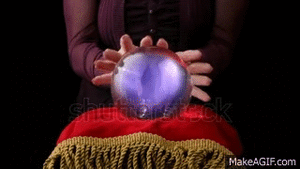
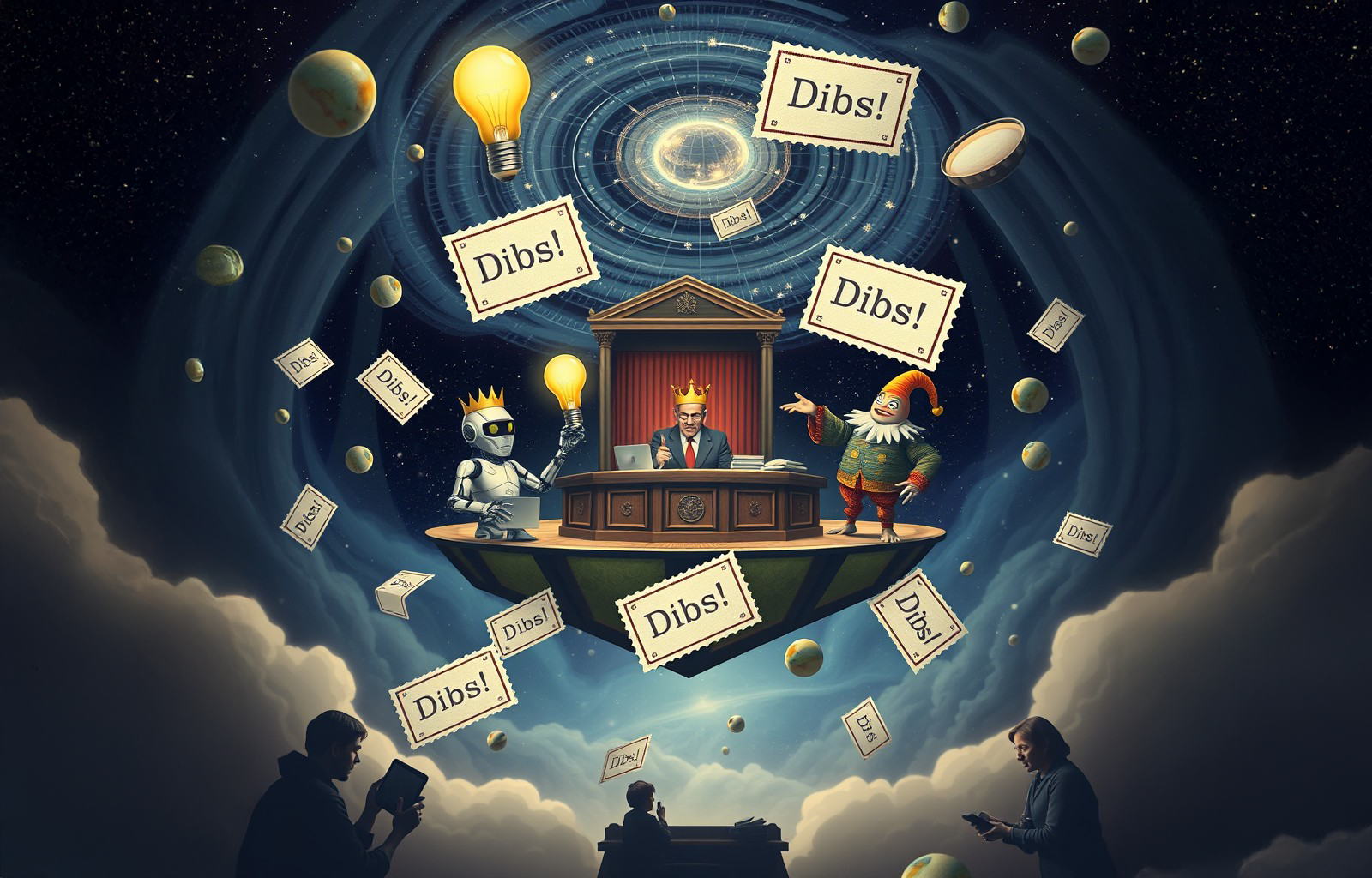
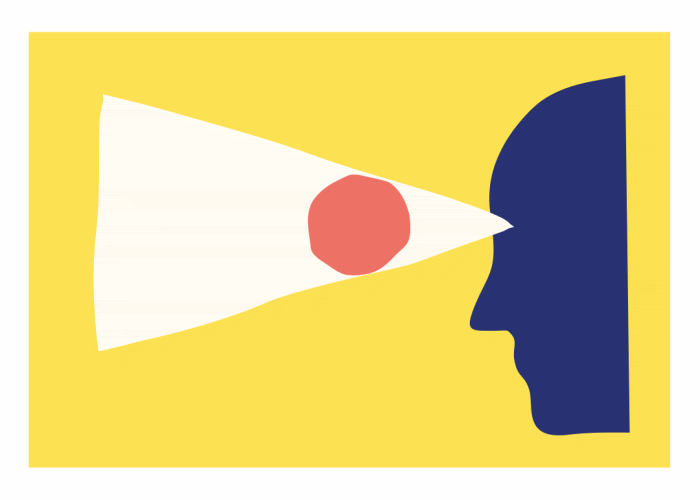
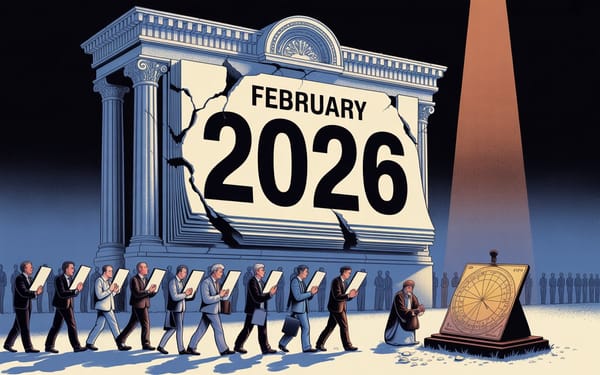
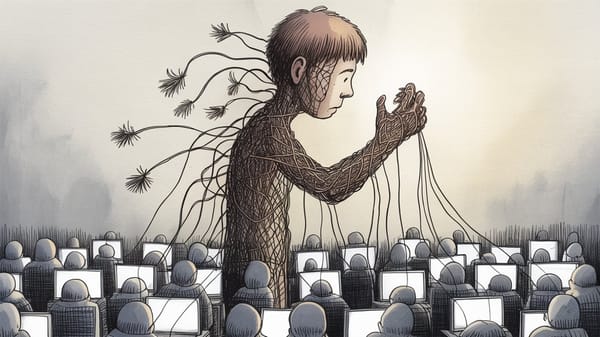
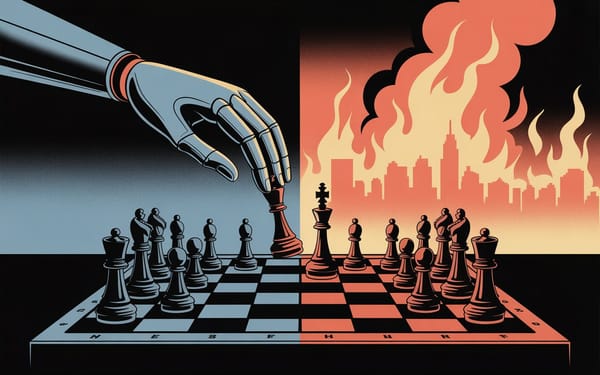
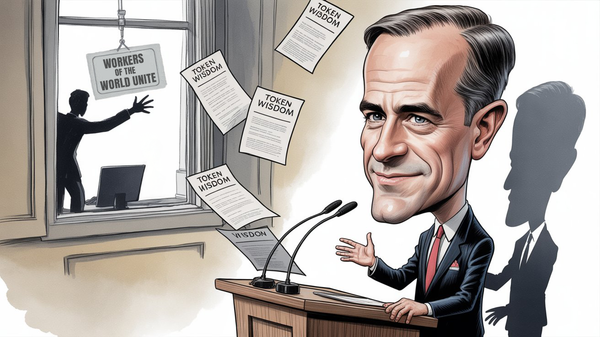
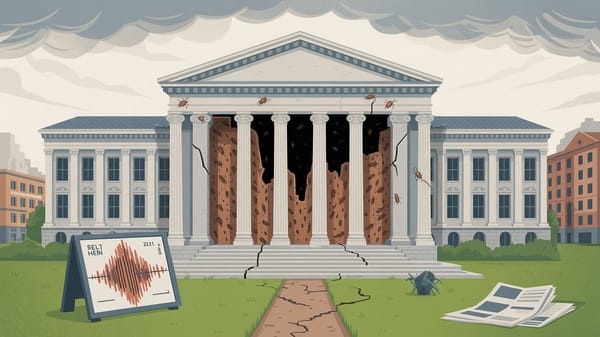
Member discussion